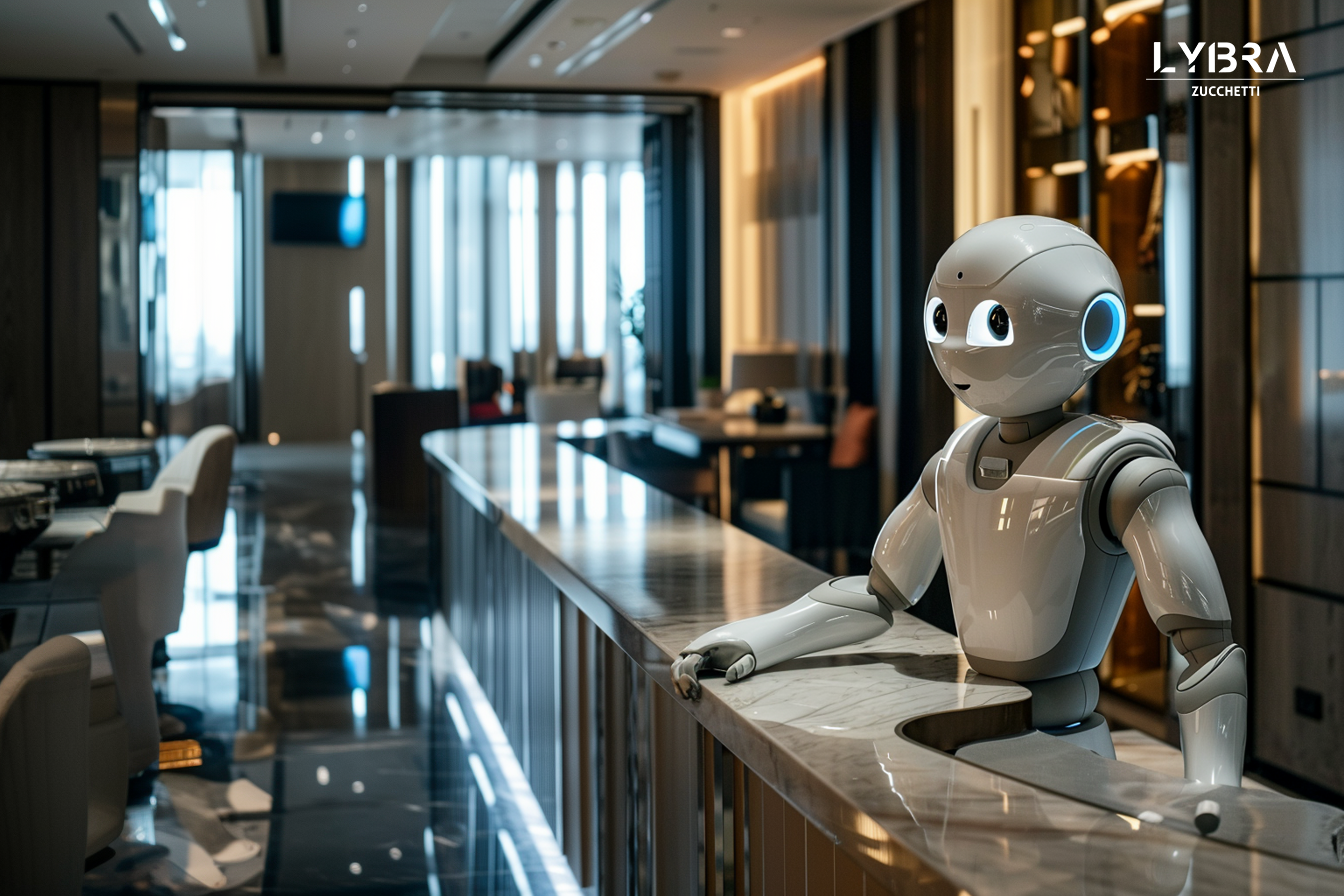The technological landscape has been dramatically reshaped by the evolution of Artificial Intelligence (AI), marking a new era where automation and smart technologies are at the forefront of innovation. In the hospitality industry, AI’s impact is becoming increasingly significant, offering unprecedented opportunities to enhance hotel operations and guest experiences. This article delves into how AI will revolutionize the hospitality sector, transforming everything from personalized guest experiences to operational efficiency.
AI and Personalized Guest Experiences
Artificial Intelligence (AI) will revolutionize the hospitality sector by enabling a level of personalization previously unattainable. In the future, hotels will utilize AI to sift through extensive guest data, tailoring each aspect of the guest experience, from the booking process to the stay itself, according to individual preferences. This customization will range from offering room choices based on specific desires to adjusting in-room settings like temperature and lighting to fit personal tastes, ensuring every guest feels uniquely catered to.
From the moment of booking, AI algorithms could predict and suggest services that align with the guest’s interests, whether it’s a room with a view or dietary preferences in dining options. Upon arrival, digital displays could welcome guests by name, and smart room systems could recommend local experiences, dining, and entertainment that resonate with their personal interests, all accessible via in-room technology.
This advanced level of personalization will go beyond traditional hospitality services, offering guests an experience that feels exclusively designed for them. It’s about transforming stays into memorable journeys where every detail reflects the guest’s preferences, from entertainment to comfort. Such tailored experiences will not only enhance guest satisfaction but also build loyalty, encouraging guests to return for the personalized touch they experienced.
Operational Efficiency Through AI
Artificial Intelligence (AI) will redefine operational efficiency within the hospitality sector, offering a smarter way to manage hotel operations. By integrating AI into back-end processes, hotels will achieve significant improvements in inventory management, staffing decisions, and maintenance scheduling. AI’s ability to analyze vast amounts of data in real-time will allow for predictive analytics in resource management, enabling hotels to anticipate demand fluctuations and allocate resources more effectively.
For instance, AI systems could predict peak occupancy periods and ensure that staffing levels are optimized to meet guest needs without overspending. Similarly, inventory management will become more precise with AI, which can forecast the necessary stock levels for amenities and supplies, reducing waste and cost. Maintenance tasks could also be scheduled proactively based on AI’s predictive insights, ensuring that hotel facilities are always in top condition, thereby enhancing guest satisfaction.
AI in Guest Services and Interaction
The integration of Artificial Intelligence (AI) into guest services and interactions will transform the hospitality industry, making engagements between hotels and guests more seamless and personalized. AI-powered chatbots and virtual assistants, available 24/7, could handle a wide range of inquiries, from simple requests for information to complex room service orders, enhancing guest convenience and satisfaction. These AI solutions will understand and respond to guest needs in real-time, offering personalized recommendations and solving issues promptly, significantly improving the overall guest experience.
Moreover, AI will play a crucial role in concierge services, where it could analyze guest preferences and past behaviors to make tailored recommendations for dining, entertainment, and local attractions.
The advancement of voice and facial recognition technologies will further streamline interactions within the hotel environment. Guests might access their rooms, personalize room settings, or request services through simple voice commands, offering a futuristic and highly convenient experience.
Revolutionizing Revenue Management
Artificial Intelligence (AI) is already revolutionizing revenue management in the hospitality industry by introducing dynamic pricing algorithms and demand forecasting that allow many hotels who have already adopted this technology to optimize room rates and maximize revenue. These AI systems analyze vast amounts of data, including market trends, competitor pricing, and consumer behavior, to adjust pricing in real-time. This responsiveness to market dynamics ensures that hotels can offer competitive rates while capitalizing on periods of high demand.
Dynamic pricing, powered by AI, goes beyond traditional revenue management strategies by considering a broader set of variables. This includes analyzing events in the vicinity, weather forecasts, and even flight cancellations, to predict changes in demand and adjust prices accordingly. Such precision in pricing strategies not only boosts revenue but also improves occupancy rates by attracting guests who are seeking value for money.
Furthermore, demand forecasting offers hoteliers a glimpse into future market trends, enabling them to prepare for upcoming demand fluctuations. This foresight allows for strategic planning in marketing efforts, staffing, and inventory management, ensuring that hotels are well-equipped to meet guest expectations without incurring unnecessary costs.
AI’s impact on booking channels and distribution strategies is also significant, allowing hotels to identify the most profitable channels and tailor their marketing efforts accordingly. By leveraging AI to analyze booking patterns and channel performance, hotels can focus their resources on the channels that yield the highest returns, thereby improving their overall profitability.
The advent of AI in revenue management empowers hoteliers with the tools and insights needed to navigate the complexities of the modern hospitality market. Through intelligent pricing and strategic planning, AI is setting a new standard for revenue optimization, enabling hotels to thrive in an increasingly competitive landscape.
AI for Enhanced Safety and Security
Artificial Intelligence (AI) will significantly enhance safety and security measures within the hospitality industry, bringing about a new era of protection for both guests and properties. AI-driven surveillance will monitor premises in real-time, detecting unusual activities or potential threats more accurately than ever before.
In the realm of health safety, AI will become instrumental. Thermal imaging and facial recognition could non-intrusively monitor guests’ health indicators. AI will also contribute to the enhancement of data security, protecting guests’ personal and financial information from cyber threats.
Challenges and Considerations
Implementing Artificial Intelligence (AI) within the hospitality industry, while offering substantial benefits, will also present its set of challenges and considerations. One of the primary hurdles is the significant investment required not only in the technology itself but also in training staff to effectively use and manage AI systems. The integration of AI technologies necessitates a shift in operational processes, which can be met with resistance from employees accustomed to traditional methods.
Additionally, there lies a delicate balance between leveraging AI for efficiency and maintaining the personal touch that is quintessential to hospitality. The industry thrives on personal interactions and relationships, and there is a risk that an over-reliance on AI could dilute the human element that guests cherish. Finding the right mix of technology and human interaction is crucial to ensure that AI will enhance rather than detract from the guest experience.
Data privacy and security are other significant concerns. As AI systems require access to vast amounts of personal and behavioral data to function optimally, ensuring the protection of this data against breaches is paramount. Hotels will have to navigate the complexities of data privacy laws and regulations, which vary by region, to maintain guest trust.
Moreover, as AI technology is predicted to evolve rapidly, there is the challenge of keeping systems up to date and continuously investing in new solutions to stay competitive. This dynamic landscape requires hotels to be agile and forward-thinking in their approach to AI integration.
Navigating these challenges requires a thoughtful strategy that will prioritize guest experience and data security, balanced with the efficiency and insights AI technology offers. Successful integration of AI in hospitality will hinge on a hotel’s ability to adapt to technological advancements while preserving the essence of hospitality that guests value.
The Bottom Line
The potential for Artificial Intelligence (AI) to revolutionize the hospitality industry is immense, offering a pathway to enhanced operational efficiency, personalized guest experiences, and more robust safety and security measures. As the technology continues to evolve, hoteliers will be presented with unparalleled opportunities to elevate their services and stand out in a competitive market. Embracing AI not only will position hotels as forward-thinking leaders but also aligns with the growing expectations of tech-savvy travelers seeking convenience, personalization, and innovation in their stays.
However, the journey toward full AI integration is complex and requires careful consideration of challenges, including the balance between technology and human interaction, data privacy concerns, and the need for ongoing investment in system upgrades and staff training. As the industry navigates these waters, the focus should remain on leveraging AI to complement and enhance the human elements that lie at the heart of hospitality.
At the heart of navigating revenue complexities of the hospitality industry lies Lybra Assistant RMS, an AI-data-driven revenue management system designed to craft successful revenue strategies. In a world marked by intense competition and prevailing uncertainties, running a hotel business is increasingly challenging. Lybra Assistant RMS emerges as a pivotal tool, empowering hoteliers with deep insights and actionable data to make informed decisions. Our advanced system harnesses the power of AI to analyze market dynamics, guest demand, and pricing trends, ensuring that hotels can optimize their revenue potential and stay ahead in the competitive landscape.
Embrace Lybra Assistant RMS and unlock the door to a future where your hotel not only survives but thrives. Click here to schedule a free demo and talk to our experts!










